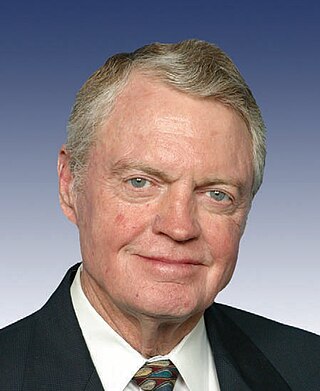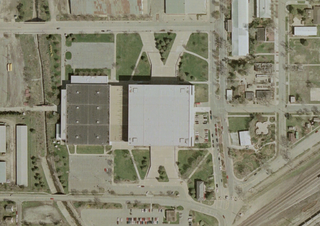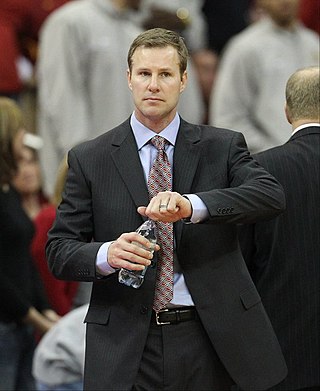Related Research Articles

The Nebraska Cornhuskers are the intercollegiate athletic teams that represent the University of Nebraska–Lincoln. The university is a member of the Big Ten Conference and competes in NCAA Division I, fielding twenty-four varsity teams in fifteen sports. Nineteen of these teams participate in the Big Ten, while rifle is a member of the single-sport Patriot Rifle Conference and beach volleyball and bowling compete as independents. The Cornhuskers have two official mascots, Herbie Husker and Lil' Red.

Thomas William Osborne is an American former football player, coach, college athletics administrator, and politician from Nebraska. He served as head football coach of the Nebraska Cornhuskers from 1973 to 1997. After being inducted into the College Football Hall of Fame in 1999, Osborne was elected to Congress in 2000 from Nebraska's third district as a Republican. He served three terms (2001–2007), returned to the University of Nebraska-Lincoln as athletic director in 2007, and retired in 2013.

Robert Simon Devaney was a college football coach. He served as the head coach at the University of Wyoming from 1957 to 1961 and at the University of Nebraska from 1962 to 1972, compiling a career record of 136–30–7 (.806). Devaney's Nebraska Cornhuskers won consecutive national championships in 1970 and 1971 and three consecutive Orange Bowls.

The Bob Devaney Sports Center is a sports complex on the campus of the University of Nebraska–Lincoln in Lincoln, Nebraska. The 8,309-seat arena opened in 1976 and serves as the primary home venue for several of Nebraska's athletic programs. The complex is named for Bob Devaney, who served as Nebraska's football coach from 1962 to 1972 and athletic director from 1967 to 1992.

Fredrick Kristian Hoiberg is an American college basketball coach and former player. He has served as the men's head basketball coach at the University of Nebraska since 2019. Hoiberg grew up in Ames, Iowa, and played college basketball at Iowa State University in Ames where he earned the nickname "the Mayor". He was drafted into the National Basketball Association (NBA) where, over his 10-year career, he played for the Indiana Pacers, Chicago Bulls, and Minnesota Timberwolves. After retiring as a player, he served as vice president for basketball operations for the Minnesota Timberwolves before beginning his coaching career at his alma mater, Iowa State University. He was there from 2010 to 2015 before coaching in the NBA for the Chicago Bulls from 2015 to 2018.
Jerry Lee Tagge is an American former professional football player who was a quarterback in the National Football League (NFL), World Football League (WFL) and Canadian Football League (CFL). He played college football for the Nebraska Cornhuskers, leading them to consecutive national championships in 1970 and 1971. Tagge played professionally with the Green Bay Packers of the NFL from 1972 to 1974, the San Antonio Wings of the WFL in 1975, and the BC Lions of the CFL from 1977 to 1979.

The Nebraska Cornhuskers football team competes as part of the NCAA Division I Football Bowl Subdivision, representing the University of Nebraska–Lincoln in the Big Ten Conference. Nebraska has played its home games at Memorial Stadium since 1923 and sold out every game at the venue since 1962.

The Nebraska Coliseum is an indoor coliseum on the campus of the University of Nebraska–Lincoln in Lincoln, Nebraska. It was the home of Nebraska's men's basketball team from 1926 to 1976 and volleyball team from 1975 to 2013. Since volleyball moved to the Bob Devaney Sports Center in 2013, the Coliseum has been primarily used for student recreation, and occasionally hosts wrestling meets.

The Nebraska Cornhuskers men's basketball team represents the University of Nebraska–Lincoln in the Big Ten Conference of NCAA Division I. The program's first year of competition was 1897, and NU has since compiled an all-time record of 1,535–1,417, with eight NCAA tournament and sixteen NIT appearances. The team has been coached by Fred Hoiberg since 2019.

The Nebraska Cornhuskers baseball team competes as part of NCAA Division I, representing the University of Nebraska–Lincoln in the Big Ten Conference. Nebraska plays its home games at Hawks Field at Haymarket Park, built in 2001 to replace the aging Buck Beltzer Stadium. The program began intercollegiate play in 1889 and has been coached by Will Bolt since 2020.

The Nebraska Cornhuskers women's volleyball team competes as part of NCAA Division I, representing the University of Nebraska–Lincoln in the Big Ten. Nebraska plays its home games at the Bob Devaney Sports Center and has sold out every home match since 2001. The team has been coached by John Cook since 2000.

John G. Cook is an American volleyball coach who is the head coach of the Nebraska Cornhuskers women's college volleyball team. In twenty-five seasons at Nebraska, he has led the Cornhuskers to four national championships and fifteen conference titles. Prior to Nebraska, Cook served as head coach of the Wisconsin Badgers for seven seasons. He earned his 800th career win in 2022, and ranks twelfth all-time in coaching wins in major college volleyball history. Cook is a three-time AVCA National Coach of the Year.
The 1962 Nebraska Cornhuskers football team represented the University of Nebraska in the Big Eight Conference during the 1962 NCAA University Division football season. Led by first-year head coach Bob Devaney, the Huskers were 8–2 in the regular season, and played their home games on campus at Memorial Stadium in Lincoln, Nebraska.

The Nebraska Cornhuskers softball team represents the University of Nebraska–Lincoln in the Big Ten Conference of NCAA Division I. The program was founded in 1976 as a club sport and became an officially sanctioned varsity sport the next year. NU plays its home games at Bowlin Stadium, constructed in 2001 as part of the Haymarket Park complex. Nebraska has made twenty-five appearances in the NCAA Division I softball tournament, with seven Women's College World Series berths. The team has been coached by Rhonda Revelle since 1993.

The history of Nebraska Cornhuskers football covers the history of the University of Nebraska–Lincoln's football program from its inception in 1890 until the present day. Nebraska competes as part of the NCAA Division I Football Bowl Subdivision, representing the University of Nebraska–Lincoln in the Big Ten Conference. Nebraska has played its home games at Memorial Stadium since 1923 and sold out every game at the venue since 1962.

The 2021 NCAA Division I women's volleyball tournament began on December 2, 2021, and ended on December 18, 2021, to determine the Division I National Champion in women's volleyball. Wisconsin won its first NCAA national championship by defeating Big Ten rival Nebraska 3–2. The championship match was played in front of an NCAA record crowd of 18,755.

The Nebraska–Penn State volleyball rivalry is a college women's volleyball rivalry between the Cornhuskers of the University of Nebraska–Lincoln and the Nittany Lions of Pennsylvania State University. Both programs are among the most successful in the history of NCAA Division I women's volleyball. Prior to 2011, the teams competed frequently as out-of-conference opponents and met nine times in the NCAA tournament. Since Nebraska joined the Big Ten they have typically played twice annually as conference opponents. Nebraska leads the series 28–12.
The 1985–86 Nebraska Cornhuskers men's basketball team represented the University of Nebraska, Lincoln during the 1985–86 college basketball season. Led by head coach Moe Iba, the Cornhuskers competed in the Big Eight Conference and played their home games at the Bob Devaney Sports Center. They finished with a record of 19–11 overall and 8–6 in Big Eight Conference play. Nebraska fell to Iowa State in the semifinal round of the Big Eight tournament, but earned an at-large bid to the 1986 NCAA tournament – the first NCAA Tournament appearance in school history – as the No. 9 seed in the Southeast region. The Cornhuskers were beaten by No. 8 seed Western Kentucky in the opening round, 67–59.
References
- ↑ "terrypettit.com".
- ↑ Archived at Ghostarchive and the Wayback Machine : Nebraska Volleyball - Terry Pettit Court Dedication - NSide Nebraska Show. YouTube .
- ↑ "Steven M. Sipple: Easy to grasp meaning of 'Terry Pettit Court' | Sipple | journalstar.com".
- ↑ "Terry Pettit (2020) - University of Nebraska Athletic Hall of Fame".